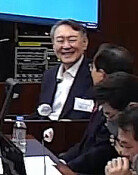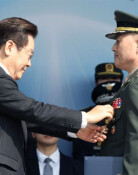Russias Richest Man, Who Backed the Opposition Parties, Arrested
Russias Richest Man, Who Backed the Opposition Parties, Arrested
Posted October. 26, 2003 22:57,
On October 25, Russias richest man Mikhail Khodorkovsky (40), chief of Russias largest oil company, Yukos, was detained being charged with embezzlement, tax evasion, falsifying document. He was arrested at a Siberian airport in Novosibirsk by armed agents from Russias FSB security service and was forced back to Moscow.
Many analysts say the actions against Khodorkovsky, who successfully managed Yukos and make it as a world class oil company after acquiring the state property, are a Kremlin-directed campaign. It is said that the detention was to curb the political ambitions of oligarchs group centering chief Khodorkovsky ahead of parliamentary election in December and a presidential contest next March.
In a statement, Yukos condemned the charges against Khodorkovsky.
Is the action out of a political ambition? Chief Khodorkovsky has been under pressure by Kremlin and was summoned by general prosecutor in July. Khodorkovskys chief Yukos associate, Platon Lebedev, was arrested in July. The pressure was a consequence of the revelation that he is funding opposition parties such as the Communist Party.
Despite Kremlins pressure, Khodorkovsky has expanded his backing to the Union of Right Forces (SPS). When the fact that he was in negotiations to sell Yukoss stake to foreign corporations such as Exxon Mibil was revealed, a rumor floated in politics that Khodorkovsky was gathering political funds aiming succeeding Putin.
Mikhail Khodorkovsky was estimated as the 26th wealthiest man in the world with $8 billion wealth (9 trillion and 4800 billion won). His comment, Ive made huge fortunes, and I am now more interested in spending money rather than earning, on his 40-year-old birthday party last June to his close people has made headlines, and Kremlin interpreted it as his will to participation to the political world.
Since then he has tried to make his image afresh by cutting off his mustache which has intensified Yukoss publicity. By that time, the general prosecutors pressure has also intensified.
How will the action influence Russias economy?
Since the arrest was done during the weekend, Russias stock market didnt show a fluctuation. However, many businessmen and political leaders expressed their concerns that Yukos case will bring a negative signal to the Russian economy that has been in rising trend since 1999. With the politically motivated arrest of the chief of the biggest company, the economic transaction by companies will be reduced as well as raising a warning flag to foreign investors.
Moreover Yukos has gained credit by western investors with a transparent and reasonable management which is rarely found in Russian conglomerates.
Yukoss ambitious plan of creating the worlds fourth-largest oil exporting company after a merger of Sibneft coming November is expected to be strained. The Russian economic and industrial club expressed its worry over the case.
The political power outweighs the conglomerates in Russia. After Vladimir Putin took office, two tycoons, Boris Berezovsky and Vladimir Gunsinsky, and other chiefs have gone into self-imposed exile to avoid criminal prosecution.
Ki-Hyun Kim kimkihy@donga.com




![지하철 타고 가는 북한산성…외국인도 반한 ‘K등산 맛집’[전승훈 기자의 아트로드]](https://dimg.donga.com/c/138/175/90/1/wps/NEWS/IMAGE/2026/01/10/133120824.1.jpg)


